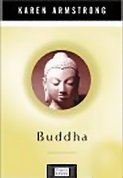I'm interested in what’s going on with religion right now. The Pew Forum survey found that among Americans ages 18-29, one-in-four say they aren’t currently affiliated with any particular religion. The number of protestant Americans is in steep decline. The group of “unaffiliated” is growing the fastest. . Karen Armstrong’s book, Buddha—which I read years ago and am re-reading—is pretty interesting in its perspective. The book was a New York Times bestseller in 2001. Armstrong is an ex-Catholic nun who’s written A Battle for God and A History of God: The 4000-Year Quest of Judaism, Christianity, and Islam, among other books. She teaches at Leo Baeck College for the Study of Judaism and received the 1999 Muslim Public Affair Council Media Award.She’s not Buddhist. No matter. In this book, she sets the historical stage for the Buddha, so that the arrival of his teachings is seen as a natural outcome of world circumstance. What fascinates me, though, is her description of what historians call “The Axial Age,” from about 800-200 B.C.E., a time that, as she says, “proved pivotal to humanity” even up to the present time.
Karen Armstrong’s book, Buddha—which I read years ago and am re-reading—is pretty interesting in its perspective. The book was a New York Times bestseller in 2001. Armstrong is an ex-Catholic nun who’s written A Battle for God and A History of God: The 4000-Year Quest of Judaism, Christianity, and Islam, among other books. She teaches at Leo Baeck College for the Study of Judaism and received the 1999 Muslim Public Affair Council Media Award.She’s not Buddhist. No matter. In this book, she sets the historical stage for the Buddha, so that the arrival of his teachings is seen as a natural outcome of world circumstance. What fascinates me, though, is her description of what historians call “The Axial Age,” from about 800-200 B.C.E., a time that, as she says, “proved pivotal to humanity” even up to the present time. From 800-200 B.C.E., there was a general dis-ease that seemed to afflict people in pretty far-flung places. They began to feel that their spiritual practices didn’t work for them anymore. A large number of prophets and philosophers tried to find solutions. She mentions the great Hebrew prophets of the eighth, seventh, and sixthcenturies; Confucius and Lao Tzu, who reformed the religious traditions of China in the sicth and fifth centuries; the sixthcentury Iranian sage Zoroaster; and Socrates and Plato in the fourth and thirdcenturies.So what happened during this time? A new level of consciousness: people became conscious of their existence. You know what I mean. A child is alive, but it takes a while before the consciousness of “I am alive” comes. How frightening, at first. A child starts clinging to the mother, crying when she leaves. I am separate! Armstrong, of course, sees this expulsion from Eden as the beginning of monotheism. There is now “something out there” which we must work to return to. We develop rituals, etc., to help.Previous rituals were to appease permanently separate gods, gods way off, gods located in plants and rocks. But during the Axial Age—partly because of the rise of a merchant class, people moving to cities and needing codes to help them restrain their egos enough to get along with each other—religion turned inward. Who am I? What’s going inside me and how can I control it?I’m way oversimplifying her thesis, and I’m sorry, but the book caught me and my mind ran off on its own. I started thinking that we’re into at least a mini-axial age, and that’s why so many people—granted, still a minority—are interested in Buddhism. It’s silent. It doesn’t impose any dogma on the practitioner. Its whole tradition is scientific: here are guidelines, it says: test it for yourself to see if it works.When I started practicing Buddhist meditation over 25 years ago, I was embarrassed to admit it. People thought it was strange. Now everyone at least understands something of the basics. Buddhism has respect in this culture, even if it’s misunderstood.The openness that’s the goal of Buddhism leaves a person in a permanent Axial Age. Not knowing. Not having a reference point, nothing to hold onto. As Keats said, "capable of being in uncertainties, mysteries, doubts, without any irritable reaching after fact & reason." There is no way to explain this non-position rationally. It is not against science: it IS science. And it is not science.No need to get what that means. I’m just thinking. I have no delusion, concern, or hope that all the world will be Buddhist someday. Fat chance. But this time we're living in seems to me another breathtakingly open time, when it is possible, at least—whether it happens or not—to see more clearly what this life is, what it’s made of.What does this have to do with writing? Do I need to come back to that? Maybe so. As Keats would say, writers worth their salt are always not-knowing. What knows is working through them, not bypassing their rational mind, but easing straight through it as if it were cheesecloth.
From 800-200 B.C.E., there was a general dis-ease that seemed to afflict people in pretty far-flung places. They began to feel that their spiritual practices didn’t work for them anymore. A large number of prophets and philosophers tried to find solutions. She mentions the great Hebrew prophets of the eighth, seventh, and sixthcenturies; Confucius and Lao Tzu, who reformed the religious traditions of China in the sicth and fifth centuries; the sixthcentury Iranian sage Zoroaster; and Socrates and Plato in the fourth and thirdcenturies.So what happened during this time? A new level of consciousness: people became conscious of their existence. You know what I mean. A child is alive, but it takes a while before the consciousness of “I am alive” comes. How frightening, at first. A child starts clinging to the mother, crying when she leaves. I am separate! Armstrong, of course, sees this expulsion from Eden as the beginning of monotheism. There is now “something out there” which we must work to return to. We develop rituals, etc., to help.Previous rituals were to appease permanently separate gods, gods way off, gods located in plants and rocks. But during the Axial Age—partly because of the rise of a merchant class, people moving to cities and needing codes to help them restrain their egos enough to get along with each other—religion turned inward. Who am I? What’s going inside me and how can I control it?I’m way oversimplifying her thesis, and I’m sorry, but the book caught me and my mind ran off on its own. I started thinking that we’re into at least a mini-axial age, and that’s why so many people—granted, still a minority—are interested in Buddhism. It’s silent. It doesn’t impose any dogma on the practitioner. Its whole tradition is scientific: here are guidelines, it says: test it for yourself to see if it works.When I started practicing Buddhist meditation over 25 years ago, I was embarrassed to admit it. People thought it was strange. Now everyone at least understands something of the basics. Buddhism has respect in this culture, even if it’s misunderstood.The openness that’s the goal of Buddhism leaves a person in a permanent Axial Age. Not knowing. Not having a reference point, nothing to hold onto. As Keats said, "capable of being in uncertainties, mysteries, doubts, without any irritable reaching after fact & reason." There is no way to explain this non-position rationally. It is not against science: it IS science. And it is not science.No need to get what that means. I’m just thinking. I have no delusion, concern, or hope that all the world will be Buddhist someday. Fat chance. But this time we're living in seems to me another breathtakingly open time, when it is possible, at least—whether it happens or not—to see more clearly what this life is, what it’s made of.What does this have to do with writing? Do I need to come back to that? Maybe so. As Keats would say, writers worth their salt are always not-knowing. What knows is working through them, not bypassing their rational mind, but easing straight through it as if it were cheesecloth.
Living in a Permanent Axial Age
in Archive
